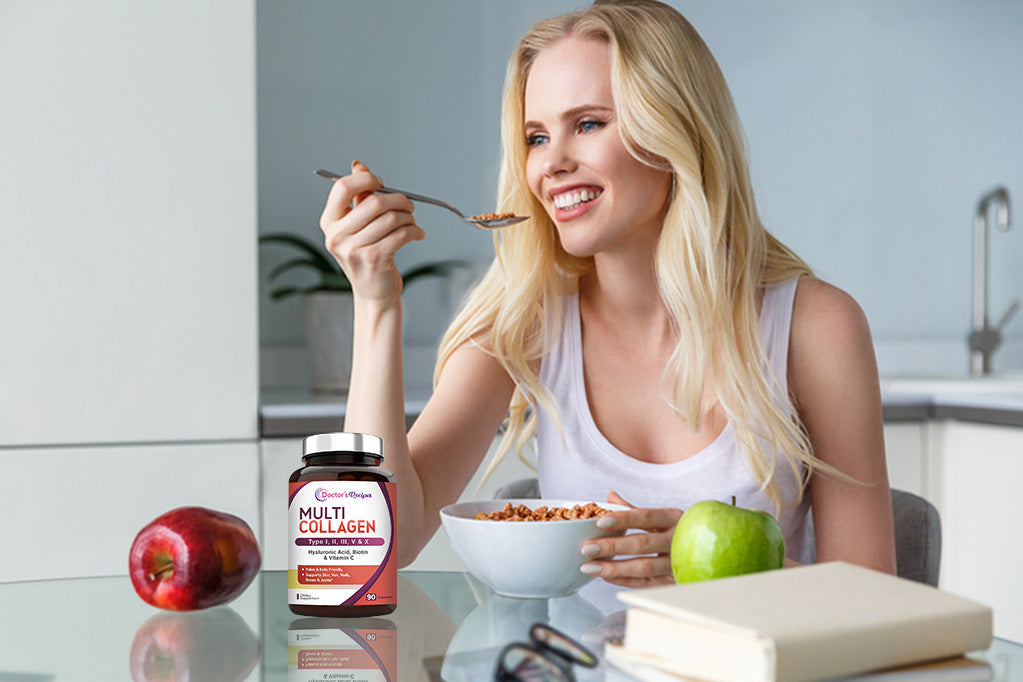10 Facts You Should Know About Collagen
What is collagen?
Collagen is the main structural protein in the human body. It is the single most abundant protein, making up from 25% to 35% of the whole-body protein content. It occurs throughout the body, but is mostly found in skin, bones, cartilage, tendons and ligaments, providing strength and structure.*
What does “collagen” mean?
Collagen is literally the “glue” that holds our tissue together. The name collagen comes from the Greek kolla, meaning “glue” and suffix -gen, denoting “producing”. This refers to the early process of boiling the skin and sinews of horses and other animals to obtain glue.
Why should you supplement collagen?
Human bodies naturally produce collagen every day. Around the age of 30, our bodies naturally begin to produce less collagen, and the first signs of aging start to occur, such as wrinkles. This is because there is less collagen providing elasticity and structural support to the skin.
Where does collagen come from?
Collagen occurs naturally in our bodies. Foods that are rich in collagen includes beef, chicken, fish, eggs. The most collagen in animal products are found in their tendons, skin, bones and ligaments.
What are the types of collagen?
As of 2011, 30 different types of collagen have been identified. The most common types include:
Type I: the most abundant collagen and found in skin, tendon, bone & ligament
Type II: the main component of cartilage
Type III: primarily present in reticular fibers, commonly along with type I
Type V: located in hair, placenta & cell surfaces
Type X: also occurs in the cartilage
What are collagen peptides?
Native collagen consists of three long chains of amino acids in a triple helix. This full length form of collagen is unhydrolyzed and difficult to digest. Collagen peptides are made by breaking down the collagen protein into much shorter amino acid chains via a process called enzymatic hydrolyzation. Because the resulting peptides, also known as hydrolyzed collagen, are physically much smaller in structure, they are more easily absorbed and used by your body.
What is the collagen hydrolyzation process?
The hydrolyzation process uses enzymes and high-pressure steam to cut the super collagen molecule into small pieces by breaking the chemical bond. The degree of hydrolysis has an effect on the average molecular weight of the final product.
What is the difference between gelatin and collagen peptides?
Collagen peptides are completely hydrolyzed collagen, while gelatin is partially hydrolyzed collagen. That means gelatin has longer chain structure, making it only dissolve in hot water. Gelatin turns to liquid when hot, and jellifies as it cools. Gelatin’s gel-forming property makes it commonly used in the food, pharmaceutical, and cosmetic industries.
Which is better, capsule or powder form?
It’s all about your personal preference. Collagen powder can be directly added to coffee, smoothies or oatmeals, while capsules are favored by those people who want a quick and easy option. Of course, you can open collagen capsules to pour the power into any drinks you want.
How to protect the collagen you already have?
While you can’t avoid aging, you can protect your existing collagen by following these tips:
√ Maintain a healthy eating lifestyle and limit sugar intake
√ Avoid excessive sun exposure
√ Don’t smoke
√ Reduce stress to a minimum


Comments (2)
I tried your brand of multi collagen and had an adverse reaction after 2 days. I have no known allergies to your listed ingredients and use Ancient Nutrition brand with no reaction.. I would like to return this canister so it can be tested for any contaminant. My PCP advised me to stop use. A refund would be in order, please.
I bought your Hydrolyzed Collagen Type 1,11,111, V & X
From Amazon.
It has a very definite smell of coconut. Which I don’t happen to mind since I like coconut even though allergy testing says I have some sensitivity to it, (though for me that is true of nearly all foods) but it alarms me that coconut is listed nowhere on the label. I just wanted to ask you about this. You may email me with your reply. But please do not post my name or email publicly or sell it. Thank you.